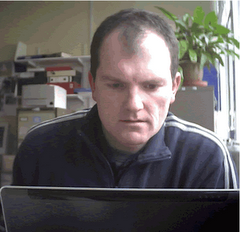As the consultant said, with reference to the bladder recently, we are 'fearfully and wonderfully made' (Psalm 139:14). There is much known about humans and much remains a mystery. The nature of 'psyche' (self) and its relation to the body is particularly tricky. There are as many varieties of reaction to our current predicament as there are people. Some cannot meet your eye. Some perhaps say a little too much. Many use the excellent phrase, 'I cannot image how you feel/are coping but if there is anything I can do to help, please just ask'. That may feel like a platitude to the speaker but it is really fine. The question, 'how are you?' is always well meant and pretty tricky to answer. Clearly none of us can roll out the usual 'OK' with much conviction. 'OK,
but...' is fairly standard recently. Apart from the fact that it changes hourly, the reply requires a few mental laps before deciding what else to add. I might prefer to say very little extra, yet I still need to keep you in the loop and give you an idea of where I'm at.
This is not a new dilemma. Of course, part of the reason for asking 'how are you?' is to give us a chance to express things, to get things "off one's chest". Many tell us we've coped extremely well and I have often 'brushed those kinds of comments off because 'everyone has hard things happen to them.' Almost five years of coping is a big deal for the human constitution. What has happened is way off the scale for most
people and beyond the realms of words to effectively communicate.
The Christian has various healthful ways of thinking about difficult situations:
- Since the Fall people have been afflicted by horrendous suffering (take the martyrs for example), perhaps none more so than the Lord Jesus Christ, and what a deal of good came from that!
- Some say there's an unwritten law that you should outlive your children, but Adam outlived Able, David outlived Absalom, Job outlived his first cohort of children, Mary outlived Jesus...
- None of this is random: God's providence is working all things for good (Acts 2:23).
- Count your blessings: for example, 'the sufferings of this present time are not worthy to be compared with the glory that shall be revealed in us' (Rom 8:18 - also 2 Cor 4:17)
- Death itself is, for the Christian, merely a portal into God's presence.
- God's strength is perfected in weakness (2 Cor 12:9).
That is far from an exhaustive list and I pity those go through trauma without recourse to any of them. But when you have prayerfully reflected on these and still feel troubled or panicked, it is perhaps time to consider what else can be done. Since we do in fact all have 'baggage' perhaps that's where professional counseling can be a help, where only one person's baggage is on the
agenda. You can air thoughts and feelings with someone totally
disconnected from your normal relationships. I know there are
reasons to be suspicious of counseling, but Phil Burnard, my
first line manager in the School of Nursing and Midwifery, seems to
think
it can be as helpful as anything else
that requires more effort (CBT) or consequences (medication). I often
think to myself, 'How did they cope in the old days?!'. The answer is,
of course, that they did not.

No comments:
Post a Comment